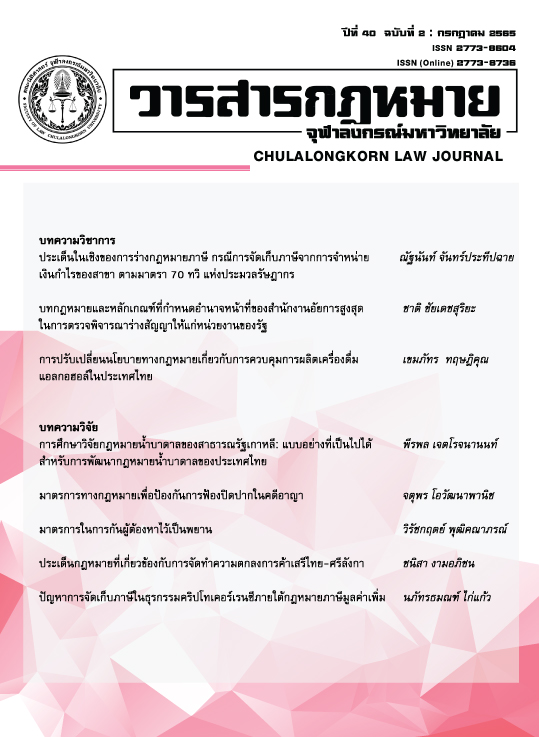Legal Measures In Taking A Suspect As A Witness
Main Article Content
Abstract
The legal measure in taking a suspect as a witness for general cases in Thailand is the discretion of the inquiry officials in seeking the evidence and the prosecutors in the prosecution, appearing as an internal regulation pattern of the inquiry officials and prosecutors without prescribed laws.Having considered that, the guideline in such regulation has ambiguous and inconsistent practices, leading to the case where the inquiry officials take the co-offenders without pressing charges as witnesses, and as a result, the prosecutors are unable to investigate the use of such discretion. Furthermore, the arrangement of the collateral for the non-prosecution of the suspect taken as a witness who are the offenders is inconsistent with the principle of liability. In order to take any suspect as a witness, a final non-prosecution order must be issued to such suspect first, In which the person with authority under prosecution shall be the prosecutors or the attorney general. Hence, this article has studied and analyzed the concepts and theories related to the legal measure for taking the suspects as witnesses, along with the foreign legal measure for taking the suspects as witnesses, to determine the model and method for legal measure taking the suspects as witnesses including the collateral in lieu of rights of the suspects taken as witnesses, suitable and consistent with the context of Thailand.
Article Details

This work is licensed under a Creative Commons Attribution-NonCommercial-NoDerivatives 4.0 International License.
The copyright in this website and the material on this website (including without limitation the text, computer code, artwork, photographs, images, music, audio material, video material and audio-visual material on this website) is owned by Chulalongkorn University Law Journal and its licensors.
1. Chulalongkorn University Law Journal grants to you a worldwide non-exclusive royalty-free revocable license to:
- view this website and the material on this website on a computer or mobile device via a web browser;
- copy and store this website and the material on this website in your web browser cache memory; and
- print pages from this website for your use.
- All articles published by Chulalongkorn University Law Journal are licensed under the Creative Commons Attribution 4.0 International License. This permits anyone to copy, redistribute, remix, transmit and adapt the work provided the original work and source is appropriately cited.
2. Chulalongkorn University Law Journal does not grant you any other rights in relation to this website or the material on this website. In other words, all other rights are reserved. For the avoidance of doubt, you must not adapt, edit, change, transform, publish, republish, distribute, redistribute, broadcast, rebroadcast or show or play in public this website or the material on this website (in any form or media) without appropriately and conspicuously citing the original work and source or Chulalongkorn University Law Journal prior written permission.
3. You may request permission to use the copyright materials on this website by writing to journal@law.chula.ac.th.
4. Chulalongkorn University Law Journal takes the protection of its copyright very seriously. If Chulalongkorn University Law Journal discovers that you have used its copyright materials in contravention of the license above, Chulalongkorn University Law Journal may bring legal proceedings against you seeking monetary damages and an injunction to stop you using those materials. You could also be ordered to pay legal costs.
If you become aware of any use of Chulalongkorn University Law Journal's copyright materials that contravenes or may contravene the license above or any material on the website that you believe infringes your or any other person's copyright, please report this by email to journal@law.chula.ac.th.


